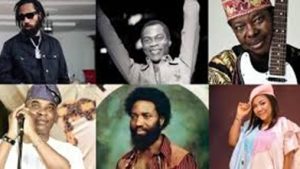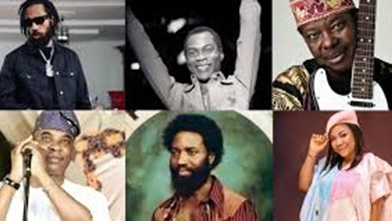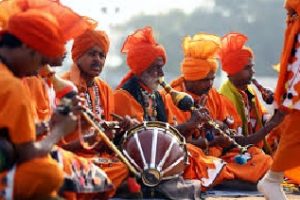Nigerian Music Industry: Past, Present, and Future
Nigerian Music Industry: Past, Present, and Future
Nigerians fell in love with Highlife when Ghanaian performers began to dominate nightclubs and social gatherings.

While Ghanaian Highlife often highlights social struggles, Nigerian Highlife embraces a lighter, feel-good tone.
It becomes the soundtrack for relaxation and enjoyment, recorded and played live in nightclubs that welcome both Ghanaian and Nigerian talents.
Nigerian Music Industry Highlife: The Sound of Celebration
One of the earliest and most prominent Nigerian Highlife bands is Bobby Benson & The Cassandra Theatrical Party.
However, the most iconic Highlife song to date is “Sweet Mother” by Prince Nico Mbarga—a timeless classic known and cherished by virtually every Nigerian.
If you’re exploring Highlife, be sure to listen to the works of Victor Olaiya, Stephen Osita Osadebe, Oliver De Coque, Sonny Okosun, Victor Uwaifo, and Orlando “Dr. Ganja” Owoh—artists who keep the genre thriving, especially in the post-civil war era.
Nigerian Music Industry: Jazz: Nigeria’s Sophisticated Soundscape
Jazz begins to take root in Lagos in 1963 with the formation of the Fela Ransome-Kuti Quintet, which performs every Monday night at the Cool Cats Inn, a hotspot for Jazz lovers.
Their success sparks interest in other jazz ensembles, including the all-star group The Jazz Preachers, led by Art Alade. While more mainstream than Fela’s group, they are equally beloved for their vibrant performances.
In time, Fela changes his band Koola Lobitos, and by the 1970s, the Jazz 38 becomes the country’s most noteworthy jazz venue.
The resident band, The Extended Family Jazz Band, founded by Frances and Tunde Kuboye, brings the scene to life. Legendary global artists like Ginger Baker and James Brown holiday in Lagos to jam or tour with local jazz legends.
Fun Fact: Frances and Tunde Kuboye are family friends of our Creative Director, Gozi. “Aunty Fran,” as she was affectionately known, was also Gozi’s childhood dentist—a remarkable woman remembered with love.
Nigerian Music Industry Women in Jazz: Breaking Boundaries
Unlike other Nigerian genres, female artists are central to jazz’s popularity. Outside Lagos, Maud Meyer becomes Port Harcourt’s jazz sweetheart and wins hearts across West Africa.
Her weight sets the pitch for the Port Harcourt Jazz Festival, time-honored in 1988 by the Port Harcourt Jazz Club.
The early years feature performances by jazz greats like Dizzy Gillespie, Oliver Jones, and Embryo. In the 1980s, Yinka Davies and others helped keep Nigerian jazz alive.
Meanwhile, Jazzville in Lagos provides a platform for emerging talents such as Funsho Ogundipe (Ayetoro) and Bisade Ologunde (Lagbaja), laying the groundwork for the next generation.
Nigerian Music Industry Afrobeat: Music as Resistance
Afrobeat, a variety born from the combination of highlife, jazz, and traditional West African rhythms, is the invention of Fela Kuti and the drummer Tony Allen.
More than just music, Afrobeat becomes a political movement.
Fela’s home and performance space, the Kalakuta Republic, serves as a revolutionary hub, where he performs unreleased songs and delivers biting political commentary – what he calls “yabbis.”
One of Fela’s most impactful works is “Zombie”, a song that harshly criticizes blind obedience in the military. It becomes an instant hit and a national controversy.
In 1977, the Nigerian government hosted FESTAC ’77, a month-long celebration of African arts and culture.
While global icons like Stevie Wonder and Gilberto Gil participate, Fela boycotts the event. Instead, he performs at the Shrine, his venue, attracting global media attention.
In retaliation, a thousand soldiers raid Kalakuta Republic, destroying his home, studio, instruments, and master tapes.
They fought Fela and harmed his mother, who later died from her injuries. Despite the tragedy, Fela continues to use Afrobeat as a weapon against corruption and oppression.
In 2000, Femi Kuti rebuilds the African Shrine, which today hosts concerts, raves, and memorial events—cementing Fela’s legacy in Lagos and beyond.
Nigerian Music Reggae: Rhythms of Resistance and Relaxation
Reggae gains popularity in Nigeria through pioneers like Tera Kota, followed by The Mandators, Ras Kimono, and Majek Fashek.
The genre resonates with Nigerians because of its laid-back island vibes—perfectly suited to the beach culture of Lagos.
The Legendary Lekki Sunsplash festival, which holds on Lekki Beach ushers in a new age where beaches double as music venues.
Bar Beach becomes the ultimate spot for music, food, and dance until flooding forces its closure. Today, partygoers head to Elegushi Beach for the same vibrant experience.
While reggae’s mainstream appeal declines, contemporary artists like Burna Boy and Patoranking keep the spirit alive, infusing Jamaican Patois into modern Afrobeats.
Nigerian Music: The Present- Afrobeats and Global Domination
Now, Nigerian mainstream music is known internationally as Afrobeats or Afropop.
Unlike Afrobeat, Afrobeats is an umbrella term that describes a fusion of Ghanaian and Nigerian pop sounds—often upbeat and rooted in themes of love, luxury, celebration, and social issues.
To stay ahead of the curve, many Nigerians still rely on mix CDs from Alaba Market, hawkers, or local DJs before digital streaming platforms catch on.
The biggest names include Wizkid, Davido, Tiwa Savage, and Burna Boy, who continue to elevate the genre on the global stage.
The festive season in December transforms Lagos into a music haven, as diaspora Nigerians return home.
The Gidi Culture Festival, in addition to Skepta’s Homecoming during Easter, further strengthens Lagos as Africa’s musical capital.
Nigerian Music: The Future- The Alté Movement and New Frontiers
Looking ahead, a new generation of Nigerian artists pioneers an alternative scene called Alté. This genre-defying movement – led by talents like Odunsi, Santi, and Lady Donli—champions creative freedom, genre-blending, and individuality.
What begins as niche performances for Lagos youths now captivates global audiences.
Alté doesn’t define a particular sound but reflects a mood, a lifestyle, and a cultural rebellion that resonates deeply with Gen Z and millennial listeners.

Nigerian Music Industry Conclusion: Building the Soundtrack of a Nation
Nigerian music continues to grow, shaped by rich traditions and bold experimentation. Artists draw from the past to forge new paths, building communities around rhythm, message, and identity.
As you listen to the playlist of Nigerian music, we leave you with this:
Music isn’t just sound—it’s a movement.




